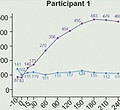
Beta Cells
Beta Cells
Researchers, providers and especially people with type 1 diabetes have long wanted a cure for diabetes. Finally, there has been progress in the production and implantation of insulin-producing beta cells by a company called Vertex. This investigational approach is called VX-880 and Dr. Peters is on the steering committee of the company for this project.
We know from the transplant surgeons that we can use human islets to “cure” type 1 diabetes. However, these transplants require islet cells harvested from cadavers and it is very difficult to obtain these calls. Moreover, immune suppressing therapy is required which comes with its own risks.
Vertex is now able to grow beta-cells in the lab from stem cells and they have now safely infused them into the liver portal vein in six study participants. The trial started slowly for safety reasons. To qualify a participant required two or more severe hypoglycemic events before enrolling and the initial two participants only received half of the expected therapeutic dose. Once a response and safety were demonstrated four other participants have now received a full dose.
There has been a variation of the response in this small sample and the most promising results has been in two of the study participants (number 1 and 3) who are now insulin independent after one year. Participant 1 has and A1c of 5.3% at 9 months and participant 3 achieved a A1c of 6% at 6 months with glucose readings similar to someone without diabetes.
This is still very early in the game with therapy that is still very experimental. All of the participants still require immune suppression therapy and there were some mild and moderate adverse events mostly involving the infusion therapy and immune suppression therapy. One participant showed some improvement but withdrew from the study due to non-trial related events.
Three participants are still new to treatment and all of them are responding to the therapy and have been free of severe hypo events. It is unclear if treatment will result in the others becoming insulin independent. This is still a very small sample, and more will be learned about the treatment overtime. What the transplant surgeons say is simple—that we need to give a higher “dose” of the beta-cells and then they will work more effectively.
The next step for Vertex is to eliminate the need for immune suppression by either creating a protective capsule for the beta-cells, or genetic engineering to cloak the cells from the immune system. Other labs and companies are also working on other approaches. This is a developing area of research that show some real promise which hopefully leads to future therapies for people with type 1 diabetes. These approaches may not exactly “cure” type 1 diabetes because people will still be making antibodies to beta-cells, but if multiple daily insulin dosing is replaced by an annual infusion of beta-cells, that would be considerable progress.

Data from two responders in the trial that show glucose readings similar to someone without diabetes.
L A T E S T N E W S

NEW “PETERS ON DIABETES” VIDEOS
Dr. Peters has a new collection of her news and opinion videos from her Peters on Diabetes series that include...,
READ MORE...



